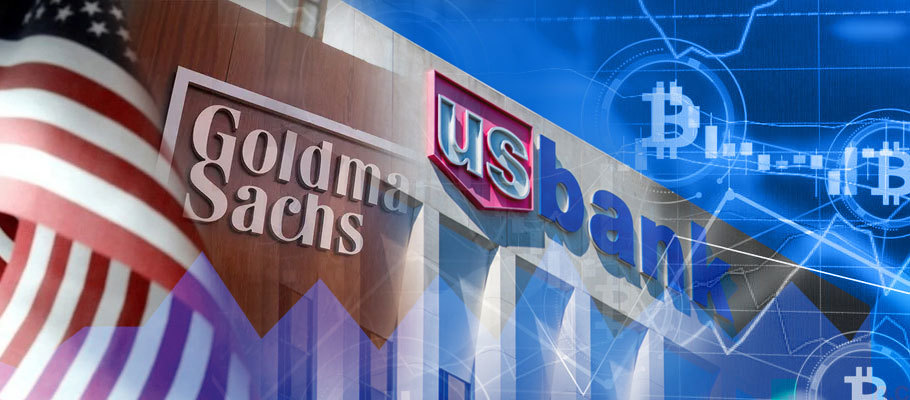
Published: March 23rd, 2022
Wall Street just took another big step towards crypto market normalization. On Tuesday, investment giant Goldman Sachs became the first major US financial institution to make an over-the-counter (OTC) cryptocurrency transaction when it opened a Bitcoin non-deliverable option (NDO).
An NDO is a type of futures contract that allows the buyer to bet on the future price of an asset without holding the asset directly. For its Bitcoin NDO position Goldman engaged the services of Galaxy Digital. The New York-based investment firm is run by crypto billionaire Mike Novogratz and operates as a liquidity provider for Goldman Sachs’ Bitcoin futures trading desk, which opened in 2021.
In a press release announcing the trade, Goldman said 'we are excited to have opened our first cash-settled crypto options trade. We believe it marks an important step in the growth of our digital assets capabilities that will also help progress the crypto asset class evolve and mature.’
Quoted in the announcement, Galaxy Digital said the NDO trade ‘is testament to our strong relationship with Goldman. We expect it will make it easier for other institutions looking at OTC as a way to trade digital assets to come into the market.’
Goldman Sachs’ attitude and participation in crypto markets has seen significant change in recent years. In 2018, it announced the coming launch of a dedicated crypto trading desk but then parked the idea. In 2021, the idea was dusted off and the desk formerly opened.
Derivatives are a popular vehicle for traditional investors who want exposure to cryptocurrency. Instead of buying and selling a digital asset, investors buy and sell a contract that wagers on the future price of a crypto asset on a given date.
It’s a massive market. Between Monday 21st March and Tuesday 22md March, crypto exchange Binance posted spot market trading volume of USD 16.3 billion and a 24-hour trading volume for its futures market of USD 43 billion.
Prior to Spring of 2021, Goldman was a vocal critic of crypto markets. Then in in May 2021, the bank published a report that hailed Bitcoin as a ‘legitimate asset class.’ The language marked an about face from its former position that crypto was essentially an insecure, fraud-ridden scam.
‘Crypto is now an investable asset,’ the report declared. ‘It comes with an idiosyncratic set of risks, due in part to being still relatively new and undergoing an adoption phase. Clients and even regulators are now treating it as an asset class rather than an interesting experiment. It’s worth stating that the emergence of a new asset class is not something previous generations have seen very often.’
The report listed the top 15 coins by market cap, from leaders Bitcoin (BTC) and Ethereum (ETH), to rising stars Monero (XMR), Aave (AAVE), and Algorand (ALGO).
Goldman included opinion from Galaxy Digital’s Novogratz, Grayscale CEO Michael Sonnenshein, plus other financial executives, academics, and economists.
Novogratz addressed the question of whether Bitcoin and other cryptos now constituted an asset class with a firm yes, arguing that a ‘critical mass of credible institutions and investors’ had engaged with crypto assets. That cemented digital currencies’ position as a recognizable asset class.
Grayscale’s Sonnenshein argued that crypto isn’t a fad, writing that Institutional investors ‘have come to appreciate that digital assets have moved well beyond a tech-enabled gimmick.’ Serious investors are attracted to ability of assets like bitcoin to act as a hedge against currency debasement and inflation. Theya re also turning to assets like Bitcoin as a way to diversify their portfolios and achieve higher risk-adjusted returns.’
Interestingly, Goldman also included a counterpoint from Nouriel Roubini, a New York University economist famously critical of cryptocurrencies. 'The idea that something with no utility, relationship with economic fundamentals, or income could be listed as a store of value is ludicrous.’ While some might dip a toe into the market, he said he said he doubted that most institutions would be willing to bear crypto's volatility and risks over the long term.
As recently as 2020, Goldman was one of the most bearish voices on crypto in traditional banking. It argued forcefully in speeches and financial op-eds that that cryptocurrency could never become a viable asset class. Like others on Wall Street, Goldman worried about extreme volatility and said there was no evidence that cryptos could be an effective hedge against inflation.
After one year, a global pandemic, and a bull run that pushed BTC past USD 60,000 at one stage, Goldman Sachs found grounds to re-think its previous reticence. Bitcoin and Ethereum have been a source of significant returns throughout the long COVID-19 pandemic, spurring new debate about BTC’s value as an inflation hedge.
Goldman began to walk back its bearish hard line as a result. In August of 2021, the bank even announced plans to create a stablecoin of its own. In September it began recruiting for a Vice President of Digital Assets.
Since then, the Wall Street stalwart has continued to find ways to accommodate cryptocurrencies across its banking practice.
In July of 2021, Goldman doubled down on its new attitude with a survey that revealed family offices were turning to cryptocurrencies as a possible hedge against unpredictable macroeconomic events, inflation, and currency debasement.
The bank surveyed than 150 family offices worldwide. Fifteen per cent of respondents said they already held cryptocurrencies, (among American respondents the figure was 25 per cent). Another 40 per cent said that currency debasement caused by COVID-19 stimulus packages had become a significant worry. Some 45 per cent expressed interest in crypto as a possible hedge against inflation.
In a statement summarizing the survey findings, Goldman said that the majority of family offices wanted the bank’s counsel about blockchain technology, with some saying they thought it could be as important as the internet.